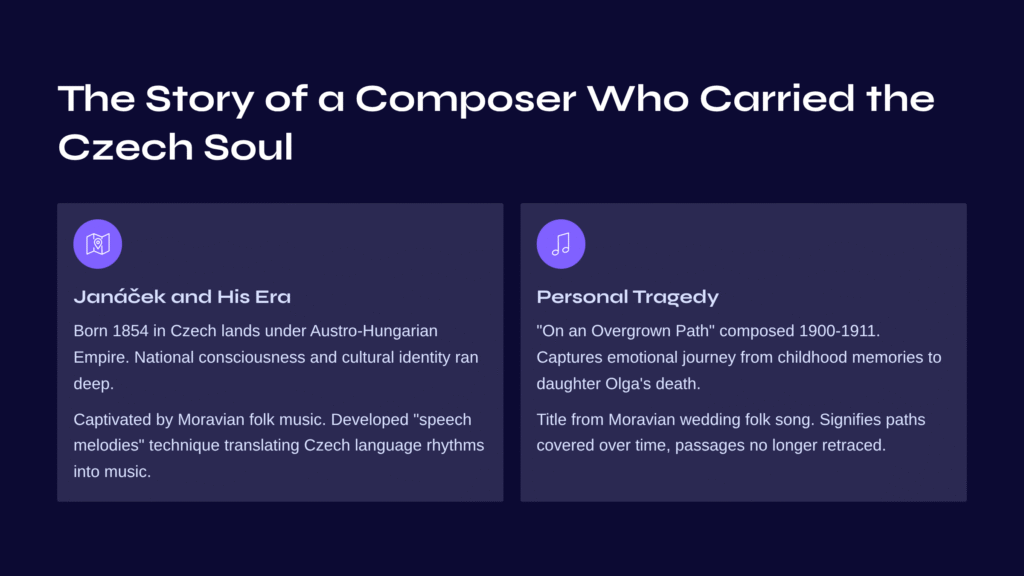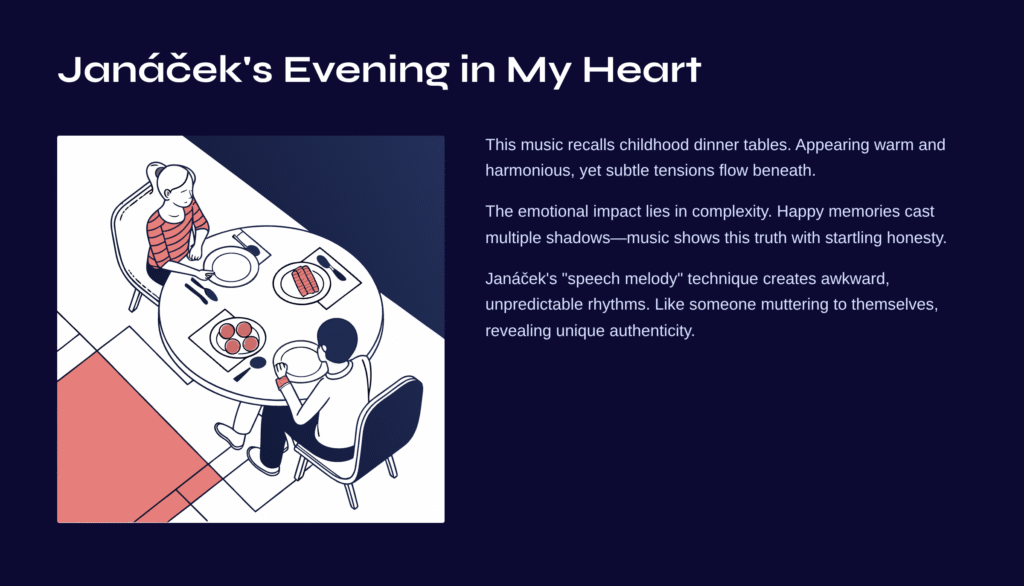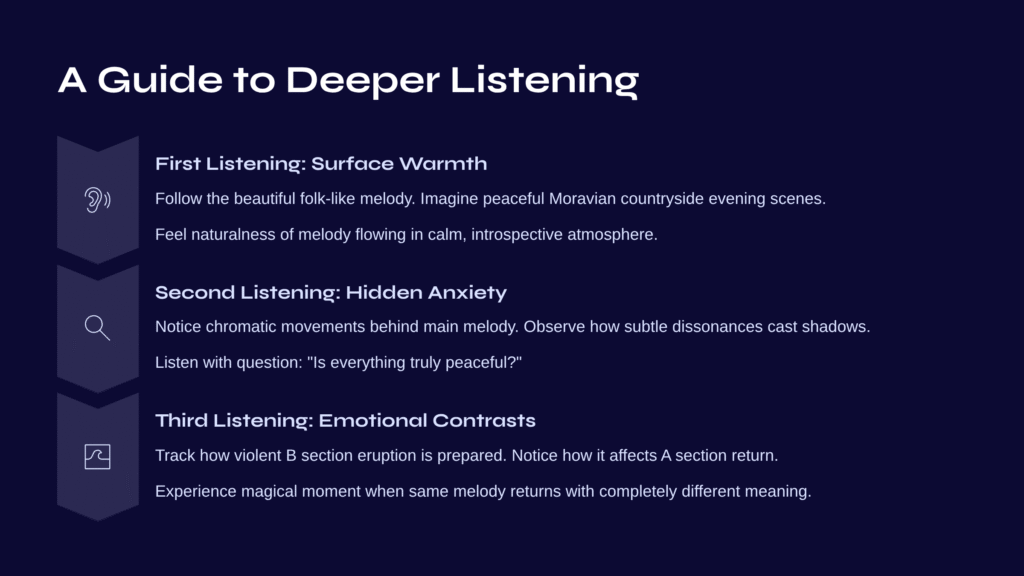Table of Contents

What Kind of Evening Was It?
Every time I hear the first notes falling onto the piano keys, I find myself wondering: was that evening truly as warm as it seems? Behind the title “Our Evenings” that Janáček painted lies a collection of memories, faded like old photographs. Yet when you peer closely at those photographs, you begin to sense a strange tension flowing between the smiling faces.
“Our Evenings,” the opening piece of Leoš Janáček’s piano cycle “On an Overgrown Path (Po zarostlém chodníčku),” is far more than music containing mere beautiful memories. Within this brief piece of just over two minutes, the most complex and contradictory emotions humans can possess are layered upon one another. Warmth and coldness, longing and anxiety, love and conflict coexist mysteriously within a single melody.

The Story of a Composer Who Carried the Czech Soul
Janáček and His Era
Born in 1854, Leoš Janáček stands as one of the most original voices in Czech musical history. The era he lived through was a turbulent period when Czech lands were under the Austro-Hungarian Empire, a time when yearning for national consciousness and cultural identity ran deep.
Janáček was particularly captivated by the folk music of the Moravian region. Rather than simply borrowing melodies from folk songs, he developed an innovative technique that translated the speech rhythms of the Czech language itself into music. This methodology, which he called “speech melodies (Napevky mluvy),” involved carefully observing the intonations and rhythms of how people actually spoke and transferring them directly into music.
A Masterpiece Born from Personal Tragedy
The entire work “On an Overgrown Path” cannot be separated from Janáček’s personal experiences. Composed between 1900 and 1911, this cycle captures an emotional journey that begins with his childhood memories and concludes with the personal tragedy of his daughter Olga’s death.
The work’s title derives from a Moravian wedding folk song. Like the lyrics “The path to my mother’s has become overgrown with clover,” it signifies paths covered over time, passages to the past that can no longer be retraced.

Hidden Stories Within the Music
The First Story: Warm Surface, Anxious Depths
“Our Evenings” begins with a quiet melody in C-sharp minor. At first listen, it truly evokes a peaceful, warm family evening. This theme, bearing characteristics of Moravian folk music, feels as familiar and comforting as a lullaby grandmother might have sung.
But listen carefully. While the main melody flows, chromatic movements in the accompaniment voices continuously murmur underneath. These chromatic colorations, like anxiety rising from the unconscious, don’t surface overtly but persistently disturb the peace beneath.
This is the genius of Janáček’s music. He expresses the complex psychological state of “everything appears fine but something is actually wrong” with just a few notes.
The Second Story: Violent Emotional Eruption
In the middle section, the music suddenly transforms. With an abrupt modulation to B-flat minor, a fierce and angry second theme emerges. This section is what musicologists call a “violent outburst.”
Here we need to examine Janáček’s private life. His marriage to Zdenka was deeply unhappy. Married in 1884, they maintained a cold relationship throughout their lives, with constant tension permeating their household.
This violent section of the B portion might be a musical translation of such domestic conflict. While the evening hours appeared tranquil on the surface, cold silence and suppressed anger between the couple seethed beneath.
The Third Story: Transformed Return
The original theme returns, but now bears an entirely different character. The aftermath of the violence that erupted in the B section still lingers in the air, and the initial warmth has somehow transformed into something lonely and hollow.
The piece ends ambiguously without clear resolution, as if leaving the question: “So what exactly was that evening?”

Janáček’s Evening in My Heart
Every time I listen to this music, I recall a scene from my childhood. The dinner table where the whole family gathered. While appearing warm and harmonious on the surface, even a young heart could sense the subtle tensions flowing between the adults’ conversations.
The emotional impact of Janáček’s “Our Evenings” lies precisely in this complexity. Human emotions are never simple, and even happy memories cast multiple shadows within them—this music shows this truth with startling honesty.
Particularly, the awkward and unpredictable rhythmic feel created by Janáček’s distinctive “speech melody” technique gives the impression of someone muttering to themselves. This is exactly the unique authenticity this music possesses.

A Guide to Deeper Listening
First Listening: Focus on Surface Warmth
When first hearing this piece, simply let your ears follow the beautiful folk-like melody. Imagine the peaceful evening scenes of Moravian countryside that Janáček depicts. Feel the naturalness of the melody flowing in its calm, introspective atmosphere.
Second Listening: Discovering Hidden Anxiety
On your second listen, pay attention to the chromatic movements murmuring behind the main melody. Observe how these subtle dissonances cast shadows over the overall atmosphere. Listen with the question: “Is everything truly peaceful?”
Third Listening: Tracking Emotional Contrasts and Changes
In your third listening, observe how the violent eruption of the B section is prepared and how it affects the return of the A section. You’ll experience the magical moment when the same melody returns but takes on completely different meaning.

Final Resonance: Truth Beyond Time
Janáček’s “Our Evenings” transcends one composer’s personal experience to explore the nature of complex memory that we all possess. This small piece of music profoundly demonstrates that no moment is completely pure or completely sad, and that memory continuously undergoes new interpretation and transformation as time passes.
Isn’t it remarkable that this music was composed in 1900? More than 120 years have passed, yet the complexity of human emotion that Janáček captured still touches our hearts. This is where the timeless power of true art resides.

Next Journey: Mahler’s Final Farewell
Having followed the complex emotional journey of “Our Evenings,” I’d like to guide you to another profound musical experience. Gustav Mahler’s Symphony No. 9, Fourth Movement “Adagio (Sehr langsam und noch zurückhaltend)” represents the most beautiful and poignant farewell, containing a composer’s final moments of life.
Where Janáček compressed hidden domestic conflicts into two minutes, Mahler unfolds contemplation of entire life and acceptance of death across twenty-five minutes. This movement, proceeding at a very slow and restrained tempo as the title “Adagio” suggests, offers the most truthful confession heard from the boundary between life and death.
Mahler departed this world shortly after completing this work. As if sensing his own end, this music contains sublime beauty that accepts and releases everything. After experiencing Janáček’s complex emotional whirlwind, wouldn’t it be fitting to encounter Mahler’s tranquil resignation and transcendent beauty?



